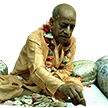Aham Brahmasmi - an essential subject: Difference between revisions
Nayanranjani (talk | contribs) (Created page with "Category:Essential Subjects <!----------------------- edit below this line -----------------------> <!------------------------ begin introduction text below ------------...") |
(Vanibot #0041: Moves Choose Another box to the end) |
||
| Line 2: | Line 2: | ||
<!----------------------- edit below this line -----------------------> | <!----------------------- edit below this line -----------------------> | ||
<!------------------------ begin introduction text below ------------------------> | <!------------------------ begin introduction text below ------------------------> | ||
Ahaṁ means 'I' and brahmāsmi means 'to be Brahman'; together they mean 'I am Brahman'. There are several connotations to the word ‘Brahman’. One expression is the impersonal, all-pervasive aspect of the Supreme, or the effulgence of Krishna, the Supreme Personality of Godhead. To the monist theorists this phrase signifies that we are ultimately one with God, or Brahman, and the goal of life is to merge into the Brahman. However to the Vaishnavas, the real implication of the phrase ‘ahaṁ brahmāsmi’ is that one is constitutionally an individual spirit soul temporarily entrapped in a material body. When one comes to realize and understand that every living entity is a part and parcel of Krishna, the Supreme origin of this entire cosmic creation, then one’s spiritual education commences. | |||
Srila Prabhupada's books, lectures, conversations and letters offer a comprehensive presentation of this essential subject as seen in the Vaniquotes '''[[Vaniquotes:Category:Aham Brahmasmi|Aham Brahmasmi]]''' category. An introduction from his books is given below in the following | Srila Prabhupada's books, lectures, conversations and letters offer a comprehensive presentation of this essential subject as seen in the Vaniquotes '''[[Vaniquotes:Category:Aham Brahmasmi|Aham Brahmasmi]]''' category. An introduction from his books is given below in the following 7 quotes. | ||
<!-------- end introduction text and don't touch next three lines ---------> | <!-------- end introduction text and don't touch next three lines ---------> | ||
== Quotes from Srila Prabhupada's books == | == Quotes from Srila Prabhupada's books == | ||
<!----------------- edit quote boxes below this line -----------------> | <!----------------- edit quote boxes below this line -----------------> | ||
{{VaniQuotebox| | {{VaniQuotebox|The Mayavadis are very proud of their grammatical knowledge, but any person who has actual knowledge of grammar can understand that aham means "I" and that "I" refers to a personality|Aham means "I"; therefore the speaker who is saying aham, "I," must have His own personality. The Māyāvādī philosophers interpret this word aham as referring to the impersonal Brahman. The Māyāvādīs are very proud of their grammatical knowledge, but any person who has actual knowledge of grammar can understand that aham means "I" and that "I" refers to a personality. Therefore the Personality of Godhead, speaking to Brahmā, uses aham while describing His own transcendental form. '''(Caitanya-caritāmṛta, Ādi-līlā 1.53)'''}} | ||
{{VaniQuotebox| | {{VaniQuotebox|For the impersonalist, pure egotism is aham brahmasmi - "I am not this body; I am spirit soul." But in its actual position, the spirit soul has devotional activities to perform|For the impersonalist, pure egotism is ahaṁ brahmāsmi—"I am not this body; I am spirit soul." But in its actual position, the spirit soul has devotional activities to perform. Therefore Lord Śiva prays to be engaged both in mind and in action in the devotional service of the Supreme Lord according to the direction of the Vedas. This is the process for purifying false egotism. '''(Śrīmad-Bhāgavatam 4.24.43)'''}} | ||
{{VaniQuotebox| | {{VaniQuotebox|We should see all women as spiritual units (aham brahmasmi), whose only duty is to satisfy Krsna. Then the influences of the different modes of material nature, which result from one's possessing a material body, will not act|When either a man or a woman is advanced in spiritual consciousness, the bodily conception of life practically vanishes. We should see all women as spiritual units (ahaṁ brahmāsmi), whose only duty is to satisfy Kṛṣṇa. Then the influences of the different modes of material nature, which result from one's possessing a material body, will not act. '''(Śrīmad-Bhāgavatam 6.18.42)'''}} | ||
{{VaniQuotebox| | {{VaniQuotebox|Aham brahmasmi: "I am not this body." This is applicable only to the person who constantly engages in the devotional service of Krsna and is thus in the transcendental stage; he is above the influence of the three modes of material nature|Just as the Lord is unaffected by the influence of the material modes, so too are His pure devotees. One who is not affected by the three modes of material nature is called a liberated soul, or brahma-bhūta soul (SB 4.30.20). Brahma-bhūtaḥ prasannātmā (BG 18.54) is the stage of liberation. Ahaṁ brahmāsmi: "I am not this body." This is applicable only to the person who constantly engages in the devotional service of Kṛṣṇa and is thus in the transcendental stage; he is above the influence of the three modes of material nature. '''(Śrīmad-Bhāgavatam 3.29.14)'''}} | ||
{{VaniQuotebox| | {{VaniQuotebox|Here the statement of self-realization aham brahmasmi, which is interpreted by the Mayavada philosophy to mean "I am the Supreme Lord," is explained. The Supreme Lord is the original seed of everything|Here the statement of self-realization ahaṁ brahmāsmi, which is interpreted by the Māyāvāda philosophy to mean "I am the Supreme Lord," is explained. The Supreme Lord is the original seed of everything (janmādy asya yataḥ (SB 1.1.1). ahaṁ sarvasya prabhavo mattaḥ sarvaṁ pravartate (BG 10.8)). '''(Śrīmad-Bhāgavatam 7.9.35)'''}} | ||
{{VaniQuotebox| | {{VaniQuotebox|The so-called liberated persons are never satisfied by the repetition of the words aham brahmasmi. Such artificial realization of Brahman becomes hackneyed, and so to relish real pleasure they turn to the narrations of the Srimad-Bhagavatam|The so-called liberated persons are never satisfied by the repetition of the words ahaṁ brahmāsmi. Such artificial realization of Brahman becomes hackneyed, and so to relish real pleasure they turn to the narrations of the Śrīmad-Bhāgavatam. Those who are not so fortunate turn to altruism and worldly philanthropy. This means the Māyāvāda philosophy is mundane, whereas the philosophy of Bhagavad-gītā and Śrīmad-Bhāgavatam is transcendental. '''(Śrīmad-Bhāgavatam 1.1.19)'''}} | ||
{{VaniQuotebox| | {{VaniQuotebox|There is a class of men akin to Mayavadi philosophers who misinterpret the aham brahmasmi and so'ham Vedic mantras to mean, "I am the Supreme Brahman" and "I am identical with the Lord"|There is a class of men akin to Māyāvādī philosophers who misinterpret the ahaṁ brahmāsmi and so'ham Vedic mantras to mean, "I am the Supreme Brahman" and "I am identical with the Lord." This kind of false conception, in which one thinks himself the supreme enjoyer, is a kind of illusion. '''(Śrīmad-Bhāgavatam 5.25.1)'''}} | ||
<!----------------- edit quote boxes above this line -----------------> | <!----------------- edit quote boxes above this line -----------------> | ||
| Line 30: | Line 28: | ||
'''Aham Brahmasmi - [[Vaniquotes:Category:Aham Brahmasmi|explore more within this category]]'''. | '''Aham Brahmasmi - [[Vaniquotes:Category:Aham Brahmasmi|explore more within this category]]'''. | ||
{{EsentialSubjectTotal}} | {{EsentialSubjectTotal}} | ||
<div style="float:left;"> | |||
{{EssentialSubjectnav}} | |||
</div> | |||
__NOTOC__ | __NOTOC__ | ||
__NOEDITSECTION__ | __NOEDITSECTION__ | ||
Latest revision as of 15:44, 22 November 2020
Ahaṁ means 'I' and brahmāsmi means 'to be Brahman'; together they mean 'I am Brahman'. There are several connotations to the word ‘Brahman’. One expression is the impersonal, all-pervasive aspect of the Supreme, or the effulgence of Krishna, the Supreme Personality of Godhead. To the monist theorists this phrase signifies that we are ultimately one with God, or Brahman, and the goal of life is to merge into the Brahman. However to the Vaishnavas, the real implication of the phrase ‘ahaṁ brahmāsmi’ is that one is constitutionally an individual spirit soul temporarily entrapped in a material body. When one comes to realize and understand that every living entity is a part and parcel of Krishna, the Supreme origin of this entire cosmic creation, then one’s spiritual education commences.
Srila Prabhupada's books, lectures, conversations and letters offer a comprehensive presentation of this essential subject as seen in the Vaniquotes Aham Brahmasmi category. An introduction from his books is given below in the following 7 quotes.
Quotes from Srila Prabhupada's books
Aham Brahmasmi - explore more within this category.
Vanipedia has now over 903 introductory articles compiled from Srila Prabhupada's books under the series titled Essential Subjects. All these articles can be seen in the Table of Content on the right side of this article and also here in this Umbrella Category. Browse through them to relish the breadth and depth of Srila Prabhupada's teachings - There is a subject for everyone.






